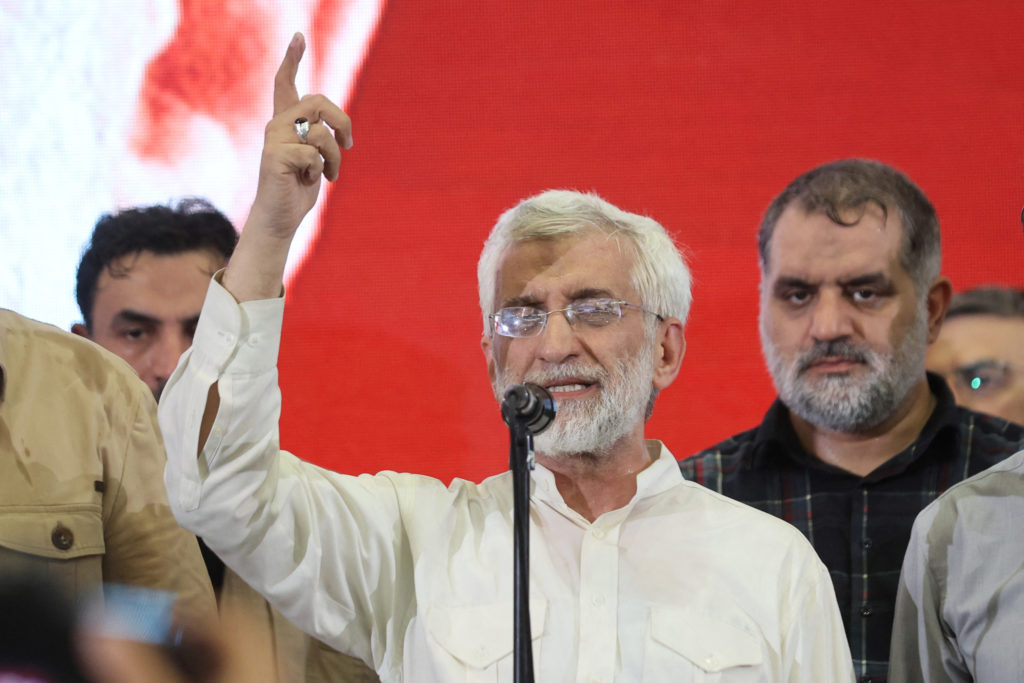Iranian presidential candidate Saeed Jalili speaks during an election event in Tehran, Iran, July 3, 2024. Photo by Majid Asgaripour/West Asia News Agency via Reuters
DUBAI, United Arab Emirates (AP) — Iran's hardline presidential candidate Saeed Jalili has long been Tehran's top nuclear negotiator but has never won praise from Western diplomats across the negotiating table, where he has repeatedly lectured them and offered them nothing.
“As Iranian carpet weaving progresses in a millimeter-by-millimeter precise, delicate and durable way, God willing, so too will this diplomatic process,” Jalili said at the time.
Hours of lectures followed in 2008 as negotiations stalled as hardline President Mahmoud Ahmadinejad and Supreme Leader Ayatollah Ali Khamenei pushed for Iran's nuclear program, putting pressure on the West that eventually eased when Iran reached a nuclear deal with world powers in 2015 that lifted sanctions on the country.
Now the 58-year-old Mr. Jalili is on the brink of being elected Iran's next president, facing off against little-known reformist heart surgeon Massoud Pezeshkian in a runoff election on Friday. Iran's nuclear program enriches uranium to nearly weapons-grade levels, and a victory for Mr. Jalili could put already stalled negotiations back on ice.
read more: Iran's reformist Pezechkian and hardliner Jalili to go to runoff election for president
Meanwhile, Jalili's own hardline vision for Iran, derided by opponents as Taliban-style, risks infuriating a population still angered by the bloody crackdown by security forces that followed protests in 2022 over the death of Mahsa Amini, who died in police custody after being detained on suspicion of improperly wearing the mandatory headscarf, or hijab.
Known for his snow-white hair and beard, Jalili is known as a “living martyr” after he lost his right leg in combat at the age of 21 during the Iran-Iraq war in the 1980s. He was born in the Shiite holy city of Mashhad on September 6, 1965. His Kurdish father was a French teacher and principal and his mother was Azerbaijani.
Before joining the Iranian Foreign Ministry, Jalili worked as a university professor with a doctorate and rose through the ranks to become the country's top nuclear negotiator under the administration of President Mahmoud Ahmadinejad from 2007 to 2013.
He made an immediate impression on Western negotiators, with then-negotiator and now CIA director William Burns calling him “a true believer in the Iranian revolution.”
“He could give surprisingly vague answers when he wanted to avoid a clear answer, and this was one of those occasions,” Burns recalled at one meeting. “At one point he told me he was still a part-time lecturer at the University of Tehran. I didn't envy his students.”
An anonymous French diplomat quoted at the time called Jalili's first round of negotiations a “fissure.”
A similar assessment was offered by another European Union diplomat in a 2008 U.S. diplomatic cable published by WikiLeaks.
“EU officials who attended Mr. Jalili's private and public meetings that day were shocked by his apparent inability or unwillingness to deviate or nuance from the same presentation, calling him a 'true product of the Iranian revolution,'” the cable said, without naming the diplomats.
Jalili later relinquished the presidency after finishing a distant third to Hassan Rouhani, a relatively moderate cleric and former nuclear negotiator, in Iran's 2013 presidential election, whose government secured the 2015 nuclear deal in which Iran drastically reduced the size and purity of its enriched uranium stockpile in exchange for the lifting of economic sanctions.
Jalili strongly opposed the agreement and set up what he called a “shadow government” during Rouhani's presidency to try to thwart his efforts. Jalili also had the backing of the late hard-liner Mohammed Taghi Mesbah Yazdi during the 2013 presidential election, who once wrote that Iran should not be stripped of its right to produce “special weapons,” a reference to nuclear weapons.
Iran has long maintained that its nuclear program is peaceful.
But U.N. inspectors and Western countries have said Iran had a systematic military nuclear program as far back as 2003. Iranian officials have stepped up threats in recent months that it could build a nuclear weapon if it so chose as Iran enriches uranium to 60 percent purity, a short technical step toward the weapons-grade level of 90 percent.
Meanwhile, Pezeshkian's supporters say that if elected, Jalili could adopt a hardline policy similar to that of the Taliban, a claim that Jalili lightly acknowledged.
“Even before the election results were announced, we called 10 million or even 9 million of our people the Taliban,” Mr. Jalili said at a recent debate, referring to reformist criticism of his policies. “Is this going to help anything?”
Jalili has not commented specifically on how he would address the ongoing debate over the hijab in Iranian society, but those in his campaign have taken a more direct stance, calling for tougher punishment for those who refuse to wear the mandatory headscarf; one lawmaker said women without headscarves are worse than “prostitutes.” But during his campaign, Jalili was ambiguous about how he would enforce the law, even capturing the moment in a press photo when he posed for selfies with women wearing loose hijabs.
Jalili is also backed by another fundamentalist ayatollah, Mohammed Mehdi Mirbagheri, from the far-right Islamic Revolutionary Stability Front, one of Iran's hardline factions. The group that supports Jalili is behind a bill passed by the Iranian parliament that could impose a 10-year prison sentence for violating the hijab. The bill has yet to be approved by Iran's Guardian Council, the body of clerics and jurists that ultimately reports to Ayatollah Khamenei.
“They want to block and shut down everything, regardless of sector,” political analyst Mehrdad Kadir told The Associated Press. “This goes for women's issues, the internet and other issues.”
Vadat reported from Tehran, Iran. Naser Karimi and Mehdi Fatahi in Tehran contributed to this report.

